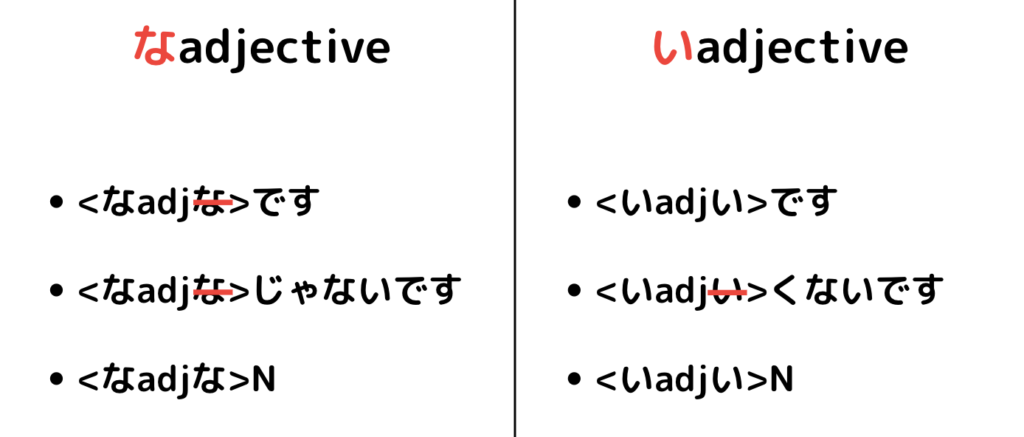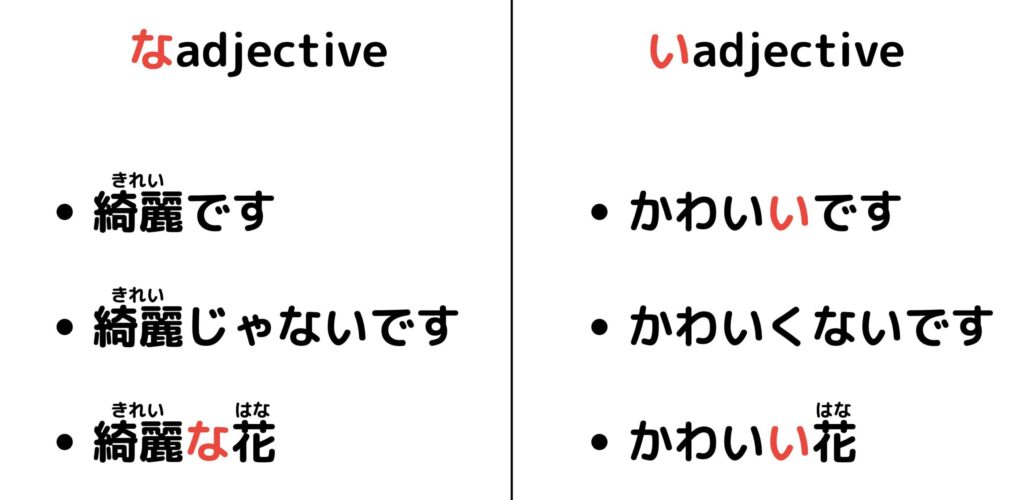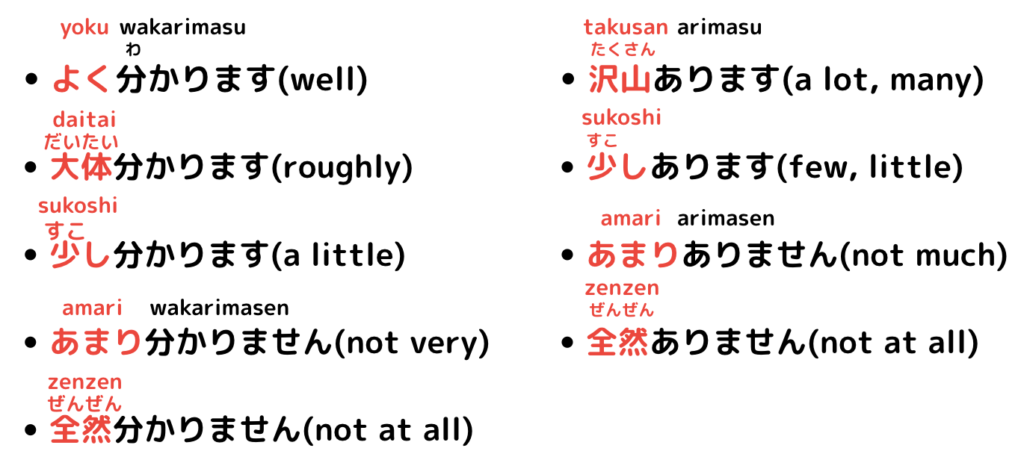1
N1はN2です
Example
- 私の名前はゆうきです。
My name is Yuuki.
N1 は N2 じゃないです/じゃありません/ではありません
Example
- 私の名前はゆきじゃないです。
My name is not Yuki.
- これは私の猫じゃありません。
This is not my cat.
- それは私のかばんではありません。
That is not my bag.
N1 は N2 ですか?
Example
- あれはあなたの車ですか?
Is that your car ?
Nも
Example
- 私も楽しいです。
I'm having fun too.
N1 の N2
Example
- ホテルの受付
hotel reception
- 車の鍵
car key
2
これ / それ / あれ
Example
- これは、私のペットです。
This is my pet.
このN / そのN / あのN
Example
- この猫は、私のペットです。
This cat is my pet.
そうです/ そうじゃないです /そうですか
Example
- そうです。
Yes it is.
- そうじゃないです。
No, It's not.
- そうですか。
Oh I see.
- そうですか?
Is it?
3
ここ / そこ / あそこ / こちら / そちら / あちら
Example
- ここは学校です。
Here is school.
- トイレはあそこです。
The toilet is over there.
N は <place> です。
Example
- お母さんは、ホテルです。
My mother is in a hotel
- 私のスマホは私の部屋です。
My phone is in my room
どこ / どちら
Example
- おすすめのレストランはどこですか?
Where is your recommended restaurants.
- これはどこのパソコンですか?
Where is this computer made?
- トイレはどちらですか?
Where is bathroom?
4
<time>時(じ)<min>分(ふん/ぷん) / 何時
Example
- 今は何時何分ですか?
What time and what min is it now?
- 今は午後12時15分です。
It is now 12:15 p.m.
- 今は朝の12時半です。
It's 12:30 in the morning now.
Vます / Vません / Vました / Vませんでした
- Vます (present, future)
- Vません (negative present, future)
- Vました (past)
- Vませんでした (negative past)
Example
- 毎朝6時に起き ます。
I get up at six every morning.
- 明日6時に起きます。
I will get up at 6 o'clock tomorrow.
- 昨日6時に起きました。
I got up at 6 o'clock yesterday
- 昨日6時に起きませんでした。
I didn't get up at 6 o'clock yesterday.
N(time)にV
Example
- 6時に起きました。
I woke up at 6 o'clock
- 日曜日に日本へ行きます。
I'm going to Japan on Sunday.
N1からN2まで
Example
- 銀行は9時から15時までです。
Banks are open from 9am to 3pm
- 夜の10時から朝の9時まで寝ました。
I slept from 10 in the night to 9 in the morning.
N1とN2 (and)
Example
- りんごとみかん
Apples and oranges
- お母さんとお父さん
Mother and Father
〜ね / 〜よね
Example
- 大変ですね。
That's tough, isn't it?
- 電話番号は8574ですね?
Your phone number is 8574 right?
- 日本へ行きますよね?
You going to Jaan right?
5
N(place)へ 行きます / 来ます / 帰ります
Example
- 京都へ行きます。
I'm going to Kyoto.
- 日本へ来ました。
I came to Japan.
- 家へ帰ります。
I'm going home.
どこ(へ)も行きません / 行きませんでした
Question + も+negative sentence = anything, anywhere, nobody
Example
- どこ(へ)も行きません。
I'm not going anywhere.
- 何も食べません。
I don't eat anything.
- 誰も来ませんでした。
Nobody came.
N(vehicle)で 行きます / 来ます / 帰ります
歩いて = by walk
Example
- 電車で行きました。
I'm going by train.
- タクシーで来ました。
I came by taxi
- 駅から歩いて帰りました。
I walked home from the station
いつ
Example
- いつ日本へ来ましたか?
When did you come to Japan?
- いつ日本へ行きますか?
When are you going to Japan?
〜よ = you know
Example
- 北海道に雪がたくさんありますよ。
There is a lot of snow in Hokkaido, you know.
- このアイスクリーム美味しいですよ。
This ice cream is delicious, you know.
そうですね
Example
- 明日は日曜日ですね。
Tomorrow is Sunday, isn't it?
- そうですね。
Oh yes, so it is.
6
NをVます
Example
- ジュースを飲みます。
I drink juice.
- 朝ごはんを食べます。
I eat breakfast.
N (を) します
Example
- サッカー(を)します。
play soccer
- 仕事(を)します。
work
- 勉強(を)します。
study
- パーティー(を)します。
give a party
何(を)しますか?/何(を)しましたか?
Example
- 月曜日何(を)しますか?
What will you do on monday?
- 昨日何(を)しましたか?
What did you do yesterday?
なん and なに
Example
- それは何ですか?
What is it?
- 何の本ですか?
What's that book about?
- 何といいますか?
What do you say?
N(place)でV
Example
- スーパーで牛肉と牛乳を買います。
I buy beef and milk at the supermarket.
Vませんか? = Whould you like to V
Example
- 一緒に京都へ行きませんか?
Would you like to go to Kyoto with me?
Vましょう = Let's V
Example
- ちょっと休みましょう。
Let's take a break
- 一緒に朝ごはんを食べましょう。
Let's have breakfast together
そうですか
Example
- 一緒に京都へ行きませんか?
Would you like to go to Kyoto with me?
- 京都ですか。いいですね。
Kyoto? Great.
7
N(tool/means)でV
Example
- はしで食べます。
I eat with chopsticks.
- 日本語で手紙を書きます。
I'm going to write the letter in Japanese.
- 「ありがとう」は英語でなんですか?
What's "Arigato" in English
<person>にNをあげます/貸します/教えます
Example
- お母さんに花をあげます。
I gave my mom some flowers
- お母さんに本を貸します。
I lent my mom a book
- お母さんに日本語を教えます。
I teach my mom Japanese
<person>から(に)Nをもらいます/習います/借ります
Example
- お母さんから(に)花を貰いました。
I received some flowers from my mom.
- 先生から(に)日本語を習いました。
I learned Japanese from teacher
- お母さんから(に)お金を借りました。
I borrowed money from my mom.
もうVました
Example
- もう宿題をしましたか?
Have you done your homework yet?
8
なadjective / いadjective

 Screenshot
Screenshot
〜ですが、〜 but
Example
- 日本の食べ物はおいしいですが高いです。
Japanese food delicious, but it is expensive.
とても/あまり very / not very
Example
- 冬はとても寒いです。
Winter is very cold.
- この映画はあまり有名な映画じゃありません。
This movie is not very well known movie.
Nはどうですか?
Example
- 日本の生活はどうですか?
How do you find life in Japan?
NはどんなNですか?
Example
- 奈良はどんな町ですか?
What kind of town is Nara?
そうですね well
Example
- お仕事はどうですか? How is your work going?
- そうですね。 忙しいですが面白いです。
Well It's busy but it's interesting.
9
Nがあります / わかります
Example
- 私は日本語がわかります。
I understand Japanese.
- 私は車があります。
I have a car.
Nが好きです/嫌いです/ 上手です/ 下手です
Example
- 私はイタリア料理が好きです。
I like Italian food.
- 私はタバコが嫌いです。
I hate cigarettes
- お母さんは料理が上手です。
My mother is a good cook.
- 私はダンスが下手です。
I am bad at dance.
どんなN
Example
- どんなスポーツが好きですか?
What kind of sports do you like?
よく/だいたい/たくさん/少し/あまり/全然

<reason> から、〜
Example
- 時間から映画を見ません。
I don't watch movie because I don't have time.
- 毎朝テレビを見ますか?
Do you watch TV every morning?
いいえ見ません。 時間がありませんから。
I don't. I don't have time.
どうして
Example
- どうしてアニメが好きですか?
How come do you like anime?
10
<place>にNがあります/ います
Example
- 私の部屋に机があります。
There is a desk in my room.
- 受付に誰がいますか?
Who is at the reception?
Nは<place>に あります/ います
Example
- お母様はホテルにいます。
Your mother is in the hotel.
- 東京ディズニーランドはどこですか?
Where is Tokyo Disneyland?
千葉県にあります。
It's in Chiba prefecture.
N1(thing/person/place)のN2(position)
Example
- 机の上に写真があります。
There is a photograph on the desk.
- 冷蔵庫にデザートがあります。
There is dessert in the fridge.
- 駅の近くで友達に会いました。
I met a friend near the station.
NやNなど
Example
- 箱の中に手紙や写真などがあります。
There are some letters, photographs and other things in the box.
11
How to say numbers
- 〜つ ーいくつですか?
- 〜個 ー何個ですか?
- 〜人 ー何枚ですか?
- 〜台 ー何台ですか?
- 〜枚 ー何枚ですか?
- 〜回 ー何回ですか?
- 〜分 ー何分ですか?
- 〜時間 ー何時間ですか?
- 〜日 ー何日ですか?
- 〜週間 ー何週間ですか?
- 〜ヶ月 ー何ヶ月ですか?
- 〜年 ー何年ですか?
どのくらいですか?/ぐらい/だけ
Example
- どのくらい日本語を勉強しましたか?
How long did you study Japanese for?
- 3年ぐらい日本語を勉強しました。
I study for three years.
- 学校に先生が30人ぐらいいます。
There are about 30 teacher at our school.
- 15分ぐらいかかります。
It takes about 15 minutes.
- 休みは日曜日だけです。
Sunday is my only day off.
<Quantifier(time period)>に一回Vます
Example
- 1ヵ月に1回だけ映画を見ます。
I watch a movie only once a month.
12
N/なadjective past

Example
- 昨日は雨でした。
It was rainy yesterday.
- 昨日の試験は簡単じゃありませんでした。
Yesterday's exam wasn't easy.
いadjective past

Example
- 昨日は暑かったです。
It was hot yesterday.
- 昨日のパーティーはあまり楽しくなかったです。
I didn't enjoy yesterday's party very much.
NはNよりadj です
Example
- この車はあの車より大きいです。
This car is bigger than that car.
NとN(と)どちらの方がadj ですか?
Example
- サッカーと野球とどちらが面白いですか?
Which (do you think) is most interesting soccer or baseball?
- サッカーの方が面白いです。
(I think) soccer is more interesting.
- 秋と冬とどちらが好きですか?
Which do you like prefer, autumn or winter?
- 秋の方が好きです。
I like autumn more.
N(の中)で< 何 / どこ / 誰 / いつ >が一番 adj ですか?
Example
- 日本料理で何が1番おいしいですか?
Which of all the Japanese dishes is the most delicious?
- 家族で誰が1番背が高いですか?
Who is the tallest in your family?
Adj の
Example
- 香里奈さんのカバンはどれですか?
Which is Karina's bag?
- あの赤くて大きいのです。
That big red one.
13
Nが欲しいです I want N
Example
- 私は友達が欲しいです。
I want some friends.
- 子供が欲しいですか?
Do you want to have children?
- いいえ、欲しくないです。
No, I don't.
Vます + たいです want to V, would like to V
Example
- 私は沖縄へ行きたいです。
I want to go to Okinawa.
- 私は天ぷらを(が)食べたいです。
I want to eat some tempura.
<place>へ<Vます / N>に行きます / 来ます / 帰ります
Example
- 日本へ日本料理を食べに行きます。
I'm going to Japan to have some Japanese food.
- 日本へ美術の勉強に来ました。
I came to Japan to study art.
- 財布を取りに帰ります。
I'm going back to get my wallet.
どこか / 何か
Example
- 冬休みはどこか(へ)行きましたか?
Did you go anywhere for your winter holiday?
ご〜
こ,shows respect.
Example
- ご注文は?
May I take your order?
14
て-form
すみませんが/ どうぞ / て-form + ください Please do~
Example
- すみませんがお名前を書いてください。
Excuse me, but could you please write your name?
- すみませんが手伝ってください。
Sorry, but please help me.
- どうぞ座ってください。
Please have a seat.
て-form + います ~ing
Example
- 泣いています
I am crying.
- ゆうき先生は今電話をかけています。
Your teacher is making a phone call now.
- 雨が降っています。
It is raining.
V-ます + ましょうか? Shall I~
Example
- 手伝いましょうか?
Shall I help you?
- 荷物を持ちましょうか?
Shall I carry your bag.
すみません。お願いします。
Yes, please.
15
て-form +もいいですか? May I do~
Example
- 写真を撮ってもいいですか?
May I take a photo?
- タバコを吸ってもいいですか?
May I smoke?
て-form + はいけません You must not do
Example
- ここで、タバコを吸ってはいけません。
You can't smoke here.
て-form + います
Example
- 私は結婚しています。
I am married.
- 田中さんを知っていますか?
Do you know Mr. Tanaka?
- 大阪に住んでいます。
I live in Osaka.
- iPhoneを持っています。
I have iPhone.
NにV
Example
- ここに入ってはいけません。
You can't come in here.
- ここに座ってもいいですか?
May I sit here?
- ここに車を止めてください。
Stop the car here, pleas.
- ここに住所を書いてください。
Write your address here, please.
16
〜て、〜て、〜ます
Example
- 昨日は天気が良くて暑かったです。
It was fine and hot yesterday.
- 奈良は静かで きれいな街です。
Nana is quiet, beautiful city.
N/なadjectiveで〜
Example
- カリナさんはインドネシア人で日本大学の留学生です。
Is Indonesian; she is a student at Japan university.
て-form +から Vます
Example
- お金を入れてから、ボタンを押してください。
Put the money in, please, and then press the button.
- この仕事が終わってから、昼ご飯を食べます。
I'm going to have it when I have finished this work.
NはNがadj
Example
- 大阪は食べ物がおいしいです。
The food in Osaka is good.
- ゆうき先生は髪が長いです。
Yuki teacher has long hair.
Nをでます/おります
Example
- 7時に家を出ます。
I leave home at seven.
- 東京で電車を降りました。
I get off the train at Tokyo.
どうやって
Example
- 大阪までどうやって行きますか?
How do you get to the Osaka?
どれ?/どのN
Example
- ミラーさんの傘はどれですか?
Which is Mr. mirror's umbrella?
- ゆうき先生はどの人ですか?
Which is Yuki teacher?
17
Vない form
Vない form + ないでください please don't do
Example
- ここで写真を撮らないでください。
Please take photograph here.
- 私は元気ですから、心配しないでください。
I'm fine, so please don't worry about me.
Vない form + なければなりません Must do
Example
- 薬を飲まなければなりません。
I must take some medicine.
Vない form + なくてもいいです need not do
Example
- 明日来なくてもいいです。
You don't have to come tomorrow.
N(time)までにV
Example
- 会議は5時までに終わります。
The meeting will end by five.
- 土曜日までに本を返さなければなりません。
I have to return the book by Saturday.
18
V-Dictionary-form
N ができます / V-Dictionary-form ことができます
Example
- 私は日本語ができます。
I can speak Japanese.
- 私は 漢字を読むことができます。
I can read Kanji.
- カードで払うことができます。
You can pay by card.
私の趣味は<N / V-Dictionary-formこと>です
Example
- 私の趣味は音楽です。
I am interested in music.
My hobby is music.
- 私の趣味は音楽を聴くことです。
I like listening to music.
My hobby is listening to music.
<V-Dictionary-form / Nの / Quantifier(time period)>まえに V
Example
- 日本へ来る前に日本語を勉強しました。
I studied Japanese before coming to Japan.
- 寝る前に本を読みます。
I read a book before going to bed.
- 食事の前に手を洗います。
I wash my hand before eating.
- 田中さんは1時間前に出かけました。
Mr. Tanaka went out one hour ago.
なかなか
Example
- 日本ではなかなかリスを見ることができません。
You don't see many squirrel in Japan.
ぜひ
Example
- ぜひ北海道へ行きたいです。
I really want to go to Hokkaido.
- ぜひ遊びに来てください。
Do please come and visit me.
19
V+たform
V-たform + ことがあります
Example
- 馬に乗ったことがあります。
I have ridden a horse.
V-たform り, V-たform り します
Example
- 日曜日はテニスをしたり、映画を見たりします。
On Sunday, I pray tennis, watched a film and so on.
い adj くなります / なadj になります / Nになります
Example
- 寒くなります。
Get cold.
- 元気になります。
Get better.
- 25歳になります。
Turn 25.
20
Polite style and plain style
〜けど、〜
Example
- 辛いけどおいしい。
It's spicy but it's nice.
- コンサートのチケットがあるけど一緒に行かない?
I have got some tickets for concert. would you like to go with me?
21
Plain form と思います
Example
- 明日雨が降ると思います。
I think it's going to rain tomorrow.
- お母さんはもう寝たと思います。
I think my mom already gone to bed.
- 日本は物価が高いと思います。
I think the price in Japan are high.
<"sentence" / plain form> と言います
Example
- 寝る前に「おやすみなさい」といいます。
We say "good night" before going to bed.
- ミラーさんは東京へ出張すると言いました。
Mr. mirror said that he would be going to Tokyo on business.
〜でしょう? right?
Example
- 明日パーティーに行くでしょう?
You are going to the party tomorrow, right?
- 北海道は寒かったでしょう?
I bet it was cold in Hokkaido wasn't?
<place>でNがあります
Example
- 東京で日本とブラジルのサッカーの試合があります。
There are match between Japan Brazil in Tokyo.
<occasion>で
Example
- 会議で何か意見を言いましたか?
Did you just say anything at the meeting?
NでもV
Example
- ちょっとビールでも飲みませんか?
How about drinking a beer or something?
Vない- form + ないと...
Example
- もう帰らないと、、、
I gotta go home...
22
V-dictionary form 時間 / 約束 / 用事
Example
- これは私が住んでいた 家です。
This is the house where I used to live.
- 前に住んでいた家が好きです。
I like the house where I used to live.
- 朝ご飯を食べる時間がありませんでした。
I didn't have time to eat breakfast.
- 私は友達と映画を見る約束があります。
I have arranged to see a film with some friends.
Vます-form + ましようか Shall we...
Example
- 今から行きましょうか。
Shall we go now?
23
〜とき、〜
Example
- 使い方がわからない時、私に聞いてください。
If you don't know how to use it, please ask me.
- 体の調子が悪い時、 水をたくさん飲みます。
I don't feel very well, I drink plenty of water.
- 暇なとき家へ遊びに来ませんか?
Please come and visit me when you have some free time.
- 子供の時、よく川で泳ぎました。
When I was a child, I often swam in the river.
V-dictionary formと、~(main clause) If...then...
Example
- パリへ行った時カバンを買いました。
I bought a bag when I went to Paris.
- これを回すと、音が大きくなります。
When you turn this, it get louder.
- 右へ曲がると、郵便局があります。
If you town right, you will see a post office.
Nがadj
Example
- 音が小さいです。
The volume is low.
Nを motion V
Example
- 公園を散歩します。
I go for a walk in the park.
- 道を渡ります。
I cross the road.
- 交差点を右曲がります。
I turn right at the intersection.
24
くれます
Example
- 佐藤さんは私にクリスマスカードをくれました。
Mr. Sato gave me a Christmas card.
- 佐藤さんは妹にお菓子をくれました。
Mr. Sato gave some snacks to my younger sister.
V-てform + あげます/ もらいます / くれます
Example
- 木村さんに本を貸してあげました。
I lent a book to Kimura-san.
- タクシーを呼んであげました。
I called a taxi for someone.
- ゆうき先生は手伝ってくれました。
Teacher Yuuki helped me.
- 先生に手伝ってもらいます。
I will ask my teacher for help.
- 私は山田さんに図書館の電話番号を教えてもらえました。
Yamada gave me the library's phone number.
- 写真を見せてくれます。
Someone will show me the photo.
NはNがV
Example
- このワインは佐藤さんがくれました。
Mr. Sato gave me this wine.
25
Plain past formら、~(main clause) If~
Example
- お金があったら、旅行します。
If I had some money I would go traveling.
- 安かったら、 それを買いたいです。
I would like to buy it if it's cheap.
- いい天気だったら、 散歩しませんか?
Shall we go for a walk if the weather is nice.
Plain past formら、~(main clause) When.../After.../Once...
Example
- 10時になったら出かけましょう。
Shall we go out once it gets to 10 o'clock?
- 家へ帰ったら、すぐシャワー浴びます。
I take a shower as soon as I get home.
〜も、〜 Even if...
Example
- 雨が降っても、 洗濯します。
I will do the laundry even if it rain.
- 便利でも、 SNSを使いません。
I'm not going to use social media, even if it's convenient.
- 日曜日でも、 働きます。
I'm going to work, even if it's Sunday.
もし
Example
- もし1億円あったら、 いろいろな国を旅行したいです。
If I had a hundred million yen, I'd like to travel round the world.
- もし友達が約束の時間に来なかったら、 どうしますか?
What would you do if your friend don't arrive at the agreed time.




